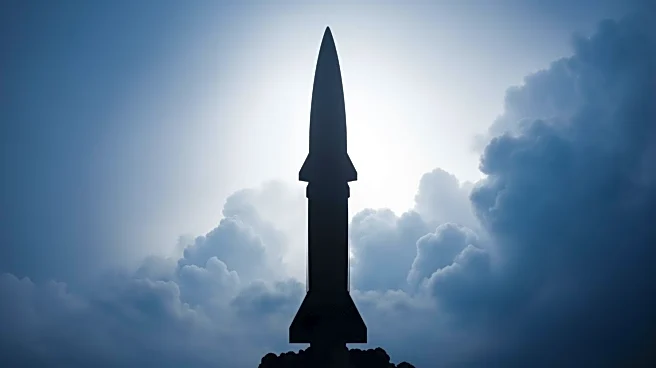What's Happening?
Russia has conducted a test of a new nuclear-capable cruise missile, known as the Burevestnik, which President Vladimir Putin claims can evade existing missile defenses. The missile, code-named Skyfall
by NATO, reportedly covered 14,000 kilometers in a recent test, spending 15 hours in the air. This development is part of Russia's broader nuclear strategy, which includes resisting Western pressure for a ceasefire in Ukraine and warning against NATO strikes inside Russia. The Burevestnik is said to have an almost unlimited range, allowing it to potentially circle the globe undetected. Despite skepticism from Western experts regarding the reliability of its nuclear engine, Russia is moving closer to deploying the missile within its military forces.
Why It's Important?
The testing of the Burevestnik missile signifies a potential shift in global military dynamics, particularly concerning nuclear capabilities. For the U.S. and NATO allies, this development could necessitate a reevaluation of defense strategies and missile defense systems. The missile's purported ability to evade detection poses a strategic challenge, potentially altering the balance of power and increasing tensions between Russia and Western nations. Additionally, the environmental risks associated with nuclear-powered missiles could lead to broader international concerns and discussions about arms control and non-proliferation.
What's Next?
Russia's continued development and testing of the Burevestnik missile may prompt diplomatic and military responses from NATO and the U.S. These could include increased sanctions, military readiness exercises, or efforts to engage Russia in arms control negotiations. The geopolitical landscape may see heightened tensions, with potential impacts on international relations and security policies. Observers will be watching for any further tests or deployments of the missile, as well as Russia's strategic moves in the context of its nuclear capabilities.
Beyond the Headlines
The introduction of the Burevestnik missile raises ethical and environmental concerns, given the potential hazards of nuclear-powered weapons. Historical precedents from the Cold War, where similar projects were abandoned due to safety risks, highlight the challenges of managing such technology. The missile's development could also influence global arms race dynamics, prompting other nations to pursue advanced military technologies, thereby complicating international efforts towards disarmament and peace.










